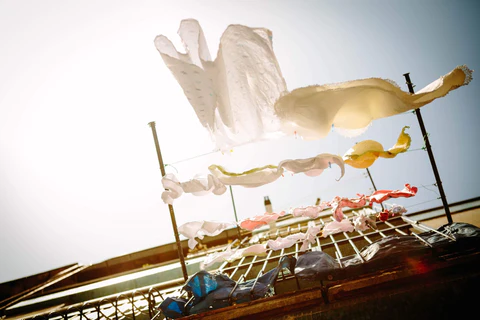3 Easy Tips For More Eco-Friendly Laundry
If you’re living as more than a single person, you’re probably aware that laundry is a never-ending task around the home. Constant clothes cycling through the dirty bin to be washed and put back in your closet. Kids? They go through 1-3 outfits per day depending on their age and level of dirty! Since hand-washing everything is off the table for most of everyone, we’ve rounded up a few easy ways to make your laundry loads more eco-friendly.
Use a Mild Detergent
Using a mild detergent with good ingredients will ensure that your wash cycle, as well as the air in your home, are safer. Many conventional detergents contain toxic ingredients, but fortunately there is no shortage of good options. Even good ole’ white vinegar makes for an effective fabric softener and stain remover if you’re in a bind.
Use Cold Water for Most Cycles
Most of the energy in a hot water cycle—around 90% actually—is used by the hot water itself. If every cycle used cold water instead of hot, our country could slash carbon emissions by millions of tons each year. We recommend using a cold cycle most often for all of your clothes, bedding and towels most often. Only use your hot water every so often when bedding or towels are heavily soiled.
Air Dry
By air drying your sheets you’ll save a lot of energy. In summer, the sun can dry fabrics in a snap on a clothes line. In the winter, you can hang clothes to dry inside on a rack. When inside, make sure that they are placed in a room with adequate ventilation, so moisture levels don’t get too high. Allow to dry fully before putting them away into your closet and drawers. At the very least, we recommend investing in dryer balls to reduce time and soften clothes at the same time. When using your dryer, make sure that your lint screen is clean so air can flow and dry your clothes faster.

More Tips for Eco-Friendly Washing
- Upgrade your washer to an energy efficient machine. Often high efficiency washers use less than half the amount of water than a conventional load.
- Make sure you have the correct size set for your washer. There’s no need to run a large load for a few items. Be sure to set it each time so the water line sits right above your clothes, with everything submerged.
- Wash less often. Obviously! Start a new routine where you only wash a few loads on Sunday instead of washing multiple loads throughout the week. Not only will this save water but, in our opinion, it sounds like an easier load for the washer too.
- Skip the dry cleaners. We know—some items need to be dry cleaned and it’s the only way. However, by avoiding purchasing these items and only taking your necessary garments in you can cut down in energy and water consumption. Not to mention that you’ll be saving money too! If you do frequent the dry cleaners, research to see if there is a “green cleaner” nearby.
- Use natural fibers in your clothes and bedding as much as possible. When synthetic fibers like polyester fleece, acrylic, and nylon are washed, thousands of microscopic plastics wash away with the rinse water. Research shows that marine life ingest these fibers which is not good for them—or us! Shop for organic cotton or bamboo.
